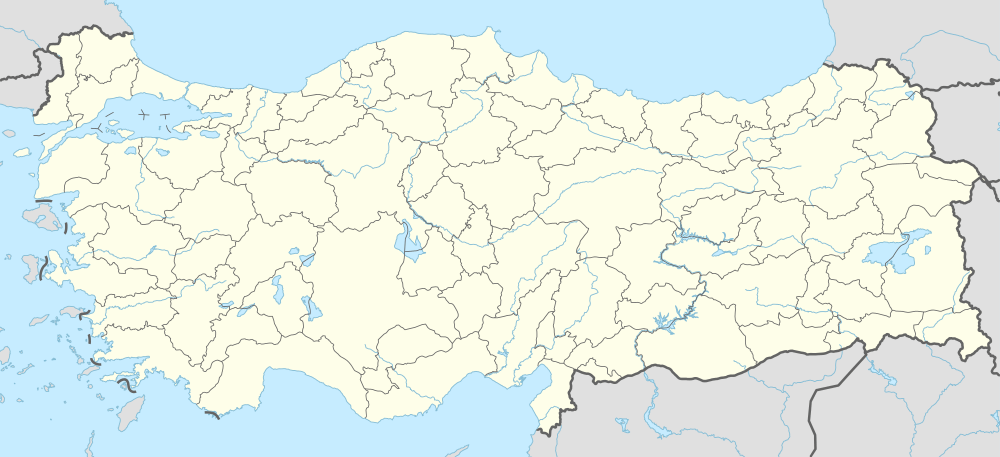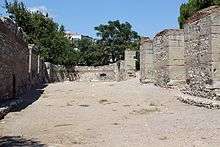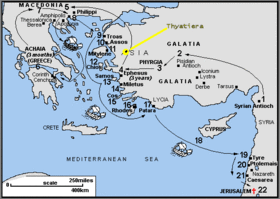Thyatira
| Thyatira (Θυάτειρα) Ancient City of Greece (Akhisar) | |
|---|---|
|
Paul's third journey | |
 Thyatira (Θυάτειρα) | |
| Coordinates: 38°55′12″N 27°50′10″E / 38.92°N 27.836111°E |

Thyateira (also Thyatira) was the name of an ancient Greek city in Asia Minor, now the modern Turkish city of Akhisar ("white castle"). The name comes from Koine Greek "Θυάτειρα" (Thuateira).[1] It lies in the far west of Turkey, south of Istanbul and almost due east of Athens. It is about 50 miles (80 km) from the Aegean Sea.
History
It was an ancient Greek city called "Pelopia" (Greek language: Πελοπία), and during the Hellenistic era, in 290 BC, it was named Thyateira (Θυάτειρα) by king Seleucus I Nicator. He was at war with Lysimachus when he learned that his wife had given birth to a daughter. According to Stephanus of Byzantium, he called this city "thuateira" from Greek θυγατήρ, θυγατέρα (thugatēr, thugatera), meaning "daughter", although it is likely that it is an older, Lydian name.[2][3] In classical times, Thyatira stood on the border between Lydia and Mysia. During the Roman era, (1st c. AD), it was famous for its dyeing facilities and was a center of the purple cloth trade.[4] Among the ancient ruins of the city, inscriptions have been found relating to the guild of dyers in the city. Indeed, more guilds are known in Thyatira than any other contemporary city in the Roman province of Asia (inscriptions mention the following: wool-workers, linen-workers, makers of outer garments, dyers, leather-workers, tanners, potters, bakers, slave-dealers, and bronze-smiths).[5]
In early Christian times, Thyateira was home to a significant Christian church, mentioned as one of the seven Churches of the Book of Revelation in the Book of Revelation.[6] According to Revelation, a woman named Jezebel (who called herself a prophetess) taught and seduced the Christians of Thyateira to commit sexual immorality and to eat things sacrificed to idols.[7]
The Apostle Paul and Silas might have visited Thyateira during Paul's second or third journey, although the evidence is entirely circumstantial. They visited several small unnamed towns in the general vicinity during the second journey. While in Philippi, Paul and Silas stayed with a woman named Lydia from Thyateira, who continued to help them even after they were jailed and released.
In 366, a battle fought near Thyateira saw the army of Roman emperor Valens defeat Roman usurper Procopius.
Bishopric
_(14595164770).jpg)
The City was home to a Christian community from Apostolic times. The community continued until 1922, when the Greek orthodox population was deported.

In 1922, the Patriarch of Constantinople appointed an Exarch for Western and Central Europe with the title Archbishop of Thyateira. The current Archbishop of Thyateira (since 1988) is Gregorios Theocharous.[9] The Archbishop of Thyateira resides in London and has pastoral responsibility for the Greek Orthodox Church in the United Kingdom.
The see of Thyatira is also included, without archiepiscopal rank, in the Catholic Church's list of titular sees.[10]
See also
References
- ↑ Greek New Testament Concordance
- ↑ Stephanus of Byzantium, De Urbibus ("On cities")
- ↑ Θυγάτηρ, Henry George Liddell, Robert Scott, A Greek-English Lexicon, at Perseus project
- ↑ Acts 16:14.
- ↑ W.M. Ramsey, The Letters to the Seven Churches of Asia, (Hodder, 1904), pp. 324-35.
- ↑ Rev. 1:11; 2:18-28.
- ↑ Rev. 2:20
- ↑ Schaff, Philip, A dictionary of the Bible(1887).
- ↑ Archbishop Gregorios - Biography at the website of the Archdiocese of Thyateira and Great Britain
- ↑ Annuario Pontificio 2013 (Libreria Editrice Vaticana, 2013, ISBN 978-88-209-9070-1), p. 988
Coordinates: 38°55′15″N 27°50′30″E / 38.9208333333°N 27.8416666667°E
